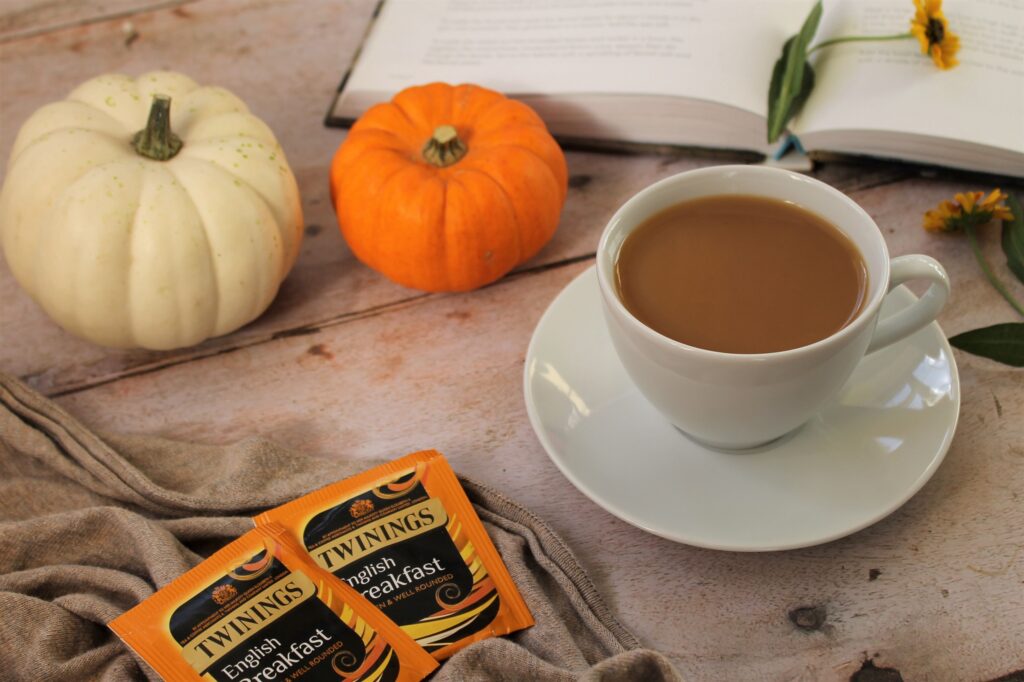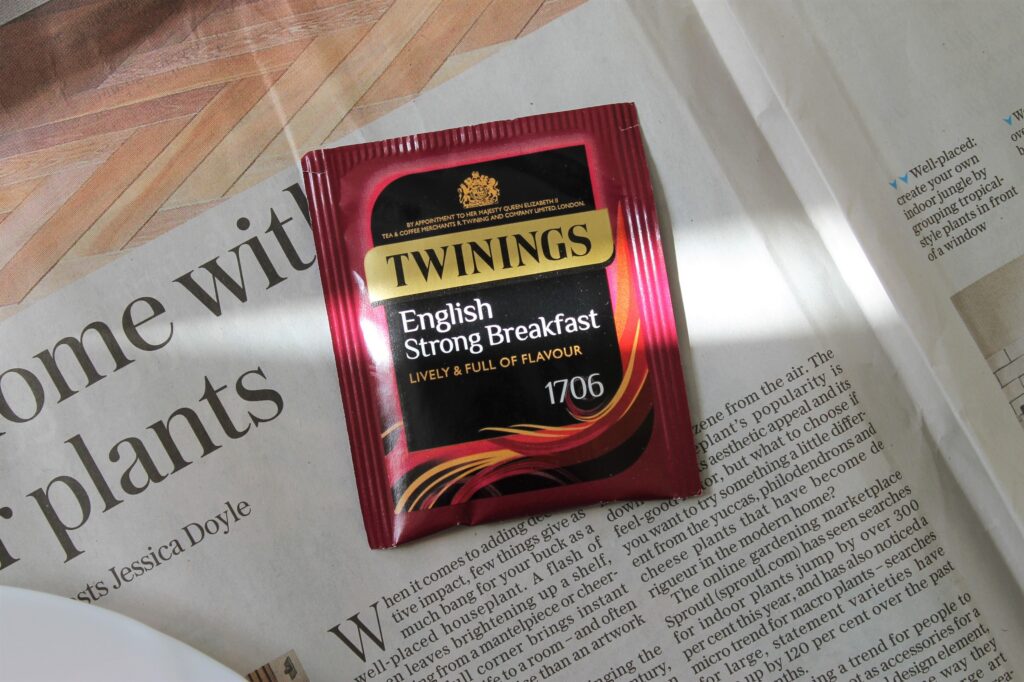Each sip tastes delicious… but is Twinings tea healthy? That’s the question I’m going to try to answer today. I’ll be looking at the ingredients in popular Twinings tea blends and going a little deeper into what makes a tea healthy or unhealthy.
If you’re in a rush, here’s the short answer: Twinings tea is healthy when consumed in moderation. It’s just leaves drenched in water, really. Twinings isn’t known for creating any super high caffeine teas or using dangerous ingredients, so the most harm you’ll come to is a bleh taste in your mouth if you stumble upon a flavour you don’t like.
The only exception to this rule is if you have a serious allergy or intolerance, in which case my advice is equally simple. Stop doom scrolling through tea articles and go talk to your doctor!
Now, let’s get to it.
Okay… What is Healthy?
According to the Oxford English Dictionary, the word “healthy” can be defined as:
Conducive to or promoting health; wholesome, salubrious; salutary.
Now, what your body needs to promote health can be drastically different from that of your friend. If you’ve got a vitamin B deficiency, you could consider some foods that are high in the vitamin B complex to be healthy for you. If you have high blood pressure, teas that avoid any and all form of liquorice could be healthy for you.
One thing that every human needs to stay healthy is hydration. Tea hydrates you. So, you guessed it, all tea can be considered healthy.
So, what it really boils down to is what you consider unhealthy. For most people, unhealthy refers to food and drink that:
- Adds no nutritional value.
- Dehydrates you.
- Is too high in sugar or fat.
- Has an unwanted bodily effect.
Tea has very little nutritional value in terms of calories, but it does have natural plant compounds like L-Theanine, EGCG and caffeine that have various health benefits. The caffeine may give you an energy boost, but if you don’t want that, you can simply find a tea that’s made from herbs instead.
That’s the thing about tea. It’s a word that encompasses so many different drinks. You are certain to find teas that are healthy and unhealthy based on your criteria for health. As long as a tea brand has a huge variety of teas, there will be a healthy option for you.
Yep, Twinings has a huge variety of teas.
So, in answer to “is Twinings tea healthy?” the long answer is yes, because with so much choice, anyone can find a tea that is good for them.
If you’re in the UK, you can buy Twinings tea directly from their official teashop to access the full range (you’ll only find the classics at the supermarket). For my international readers, Twinings’ Amazon store is your friend.

Twinings Tea Sources
When many people ask if Twinings tea is healthy, they are referring to the standard cuppa you have with milk and sugar. This kind of tea is made from the leaves of the Camellia sinensis plant, which are oxidised to turn them malty and rich for a hearty cup of ‘black tea’.
Nutritionally, a standard Twinings black tea with no ingredients besides tea leaves (let’s use Twinings Everyday tea as an example) contains:
- 1 kcal
- 0g fat
- 0g carbs
- 0g sugar
- 0g protein
- 0g salt
If you add milk and sugar, that’s a different story (and you’re better off asking “is milk and sugar healthy” than pointing your finger at Twinings). The tea element of your cuppa is rich in plant-based amino acids and compounds, like the tannins that give tea that slightly drying and oh-so-satisfying taste.
A standard cup of Twinings tea only becomes unhealthy when you drink so much that you take in more caffeine than you can handle. Most guidelines recommend no more than 400mg in a day (that’s roughly eight cups of tea). You might also find that black tea on an empty stomach leaves you feeling a bit queasy – best add a slice of toast to your breakfast to line your stomach.
Is Twinings Healthy for the Planet?
The way tea leaves are sourced can be healthy or unhealthy not just for you (contaminants and pesticides) but also the planet.
Twinings sources their teas from all over the world, from Argentina to India. Each tea blend they have will contain tea from different countries – and these countries may change from season to season as Twinings finds the best place to source their tea.
To ensure that tea growers use practices that are healthy for the workers, communities and environment, there are numerous organizations that hold them accountable. You’ve probably heard of Fairtrade and maybe even USDA Organic certification.
Twinings doesn’t have either.
Instead, Twinings have created their own program called ‘Sourced with Care’. This means that they hold themselves accountable. If you want to take them at their word, that’s great. But if, like me, you are sceptical at heart, then this can be a little off-putting. If you are in the latter camp, I recommend switching to another familiar brand in the UK called Clipper.

Natural Ingredients
Outside of traditional tea leaves from the Camellia sinensis plant, Twinings sources a vast array of different flavoursome ingredients from around the world. And they’re quite delicious. Trust me, I’ve reviewed quite a few, including:
- Peach, Orange and Citrusy Baobab – contains whole fruit pieces (like apple chunks and orange peel) along with baobab fruit pulp and natural peach flavouring.
- Raspberry, Lemon and Rose Petals – contains rose petals (duh), liquorice root for sweetness, and hibiscus which is actually made from parts of the flower rather than the fruit of the plant.
- Moments of Calm Superblend – chamomile and roasted chicory root (an ingredient that adds a richness like coffee) meet vanilla flavouring and niacin.
There’s a lot of variety here! For the most part, Twinings fills out the bulk of their teas with ingredients like hibiscus, blackberry leaf, liquorice and apple. They then supplement with natural flavourings and sometimes vitamins to finish the flavour profile.
Compared to a tea blend that only uses real ingredients, Twinings isn’t the healthiest. But they do make an effort to stick with natural flavourings and real ingredients when they can.
So, Should You Drink Twinings Tea?
In comparison to many tea brands, Twinings are averagely healthy. They aren’t filling their teabags with artificial flavours, but they aren’t attaining organic status either. They are comfortably riding the middle of the road with a humungous range of teas on their official website.
You’ve got to remember, Twinings are making tea for the masses. You shouldn’t reach for a cup of Twinings if you’re after totally organic, hand-picked, grass-fed, lovingly packaged, Ivy League graduated cranberries in your cranberry tea. For that kind of brew, look to gourmet companies and small indies (I have a list of Independent Tea Brands, by the way).
But you should pick Twinings if you’re after a moderately healthy, deliciously affordable tea that’s a little bit better than the usual supermarket chums lining the tea aisle. And that’s my final verdict.

FAQs
Hell yeah! Twinings tea is a popular brand in the UK and around the world. Their teas aren’t luxurious and rare, but they are generally pretty good and can be relied upon for a good cuppa on a hard day. One of the reasons Twinings are good as a brand is because they have a huge range of flavours, so you’re likely to find something that will suit you.
Twinings have a caffeine-free range (hurrah!) but not all of their teas are caffeine-free. Look for teas like Sleep Tea or the Fruit Selection Box for caffeine-free options. You can also find decaf teas at Twinings, but they usually have a few mg of caffeine lurking in each cup.
Some of Twinings tea may be organic, but the vast majority is not. Instead of using accredited programs to verify the ethical and organic status of their tea (like USDA Organic, Fairtrade or Soil Association) Twinings have created their very own ‘Sourced with Care’ program to ensure their tea is ethically sourced. We’ll just have to take their word for it.
Most of Twinings tea is vegan. If the tea is made solely from tea leaves (like their English Breakfast and Everyday teas) then they are 100% vegan. If you choose a Twinings tea that contains flavourings, colourings or additional flavours, make sure you check the ingredients list before you sip.
Well, if you’ve actually read to the end of my article (kudos) then I think it’s a definite yes to this question! If you care about the tea you drink and its impact on your body, the planet and the communities that grow it, then you’ve come to the right place. At Immortal Wordsmith, you can find a huge range of tea reviews to explore. Start at the Tea Review Index.
